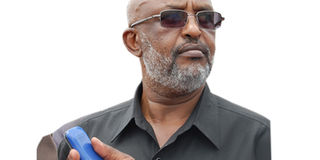Bashir has no regrets for moving on

Bashir speaks to journalists during a recent interview in Jinja recently.
What you need to know:
Yusuf Musa Bashir is the chairman and managing director of Hared Petroleum. He recently sat with Ismail Musa Ladu to talk about his business plans and achievements. Below are excerpts.
Yusuf Musa Bashir is a meticulous businessman, who hates excuses, weighs all options before taking an important decision and above all he is a down-to-earth man.
His approach to business has so much to do with his professional background given that studied sciences but believes everybody has the ability to do business- “no matter your standing in society”.
“In one way or the other we are all businessmen and women. No matter what we do in our earlier lives we somehow end up there - in business,” Bashir says in interview at his office in Jinja Town recently.
“…the important thing is to start (business) early because the earlier you do it the better. And always remember the biggest risk is not to take risks,” he adds.
Bashir’s business journey
After studying hydrology, through a scholarship in a Saudi Arabia university and later a master’s degree in geology from Ohio University, US, Bashir spent a few years in formal employment, before he started juggling a number of businesses.
He started out in the transport but eventually ventured in the oil business, where he has spearheaded steady growth for more than 15 years now.
Initially he had wanted to be an oil dealer but government policies here (Uganda) requires one to do both retailing and dealership.
And that is how Bashir embarked on his long journey that would later see him establish Hared Petroleum, with the first outlet in 2001 at Kira Road.
Getting a lifeline
In 1999 Bashir had through government secured permission to use the Jinja fuel reservoirs. Through this, he would borrow fuel from. fuel from Kenya and pay later.
“I didn’t borrow money from banks. But I borrowed fuel in Kenya using my trucks log books as security,” he says.
“So it is not always about the capital – startup, but the brain. Capital is using your brain well and honestly. And you must have knowledge of what you are doing or involved in,” he adds.
Challenges
The industry, according to Bashir, has problems related to fuel smuggling, which brings about unfair competition.
This, he says, has also exposed the market, which ends up buying adulterated fuel smuggled into the country by fake dealers.
Additionally, Bashir says exorbitant prices of land make business hard, because a fuel station can only be appreciated if it is easy to access and near the road.
Plans ahead
Going forward, Bashir plans to invest in furnishing (physical appearance of the outlets) the stations increase the company’s assets and backups as well as spread into other regional markets beginning with Kenya.
He also plans to increase the capacity of the company’s as well as building capacity that will afford his team to sufficiently manage the national reserve, especially to avert any fuel crises that might come in future.
Achievements
Bashir currently employs more than 1,000 people both directly and indirectly.
“It makes me feel satisfied to create employment for Ugandan and will never retire from helping Uganda to develop,” he says.
Bashir also feels proud of his team, given that they won a number of challenges to manage the national fuel reserves in Jinja.
“I have never regretted my decision of living formal employment I fell satisfied and fulfilled. If I had not left being employed my journey would not have been complete. I feel proud I have spent fifteen years in this sector,” he concludes.
Investment and jobs created
To date Hared has more than 40 filling stations spread across the country, with each station employing a minimum of 10 people.
To establish an outlet, depending on the location, costs between Shs200 and 300m.
Recently, Hared was tasked to refurbish the 30 million litres capacity national fuel reservoirs in Jinja and according to Bashir, the company used more than Shs5b.
The later 2011 placed a bid, winning a 10-year concession to run the government fuel reservoirs but this was no easy feat because: “When we first applied for a license, we found a lot of opposition, especially from the bigger players in the industry who thought we could not live up to the challenge, but we have proven that we are capable and for that we thank government for trusting us and letting us manage this facility.”
Industry insights
Fuel and oil dealers are regulated by Uganda National Bureau of Standards, which monitors a number of activities in the industry, including compiling reports on fuel adulteration.
However, a recent report from UNBS indicates that several retail outlets adulterate fuel, a trend that is more rampant in western Uganda.
Fuel is usually adulterated in the process of transportation, thus it is at this stage, according to Bashir, when they are most vigilant.
However, through vigilance UNBS says fuel adulteration has reduced to below 20 per cent out of the retail capacity of 1,170 stations within the marking radar.
Small companies have also been found to be the biggest culprit, which as Bashir says results from the lack of close supervision of filling stations. However, he says at Hared they have been able to block any intensions that may lead to adulteration through a case-by-case supervision of all dealers.




